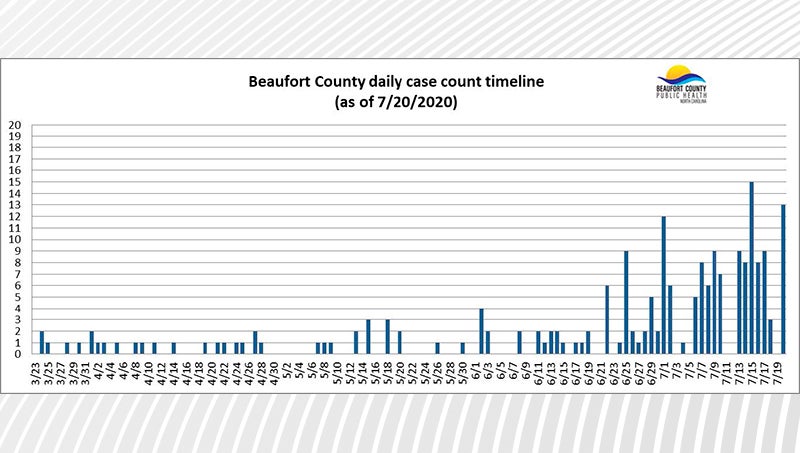County outpaces state in percentage of positive COVID cases
Published 11:32 pm Tuesday, July 21, 2020

- (Beaufort County Health Department/Beaufort County Emergency Services)
|
Getting your Trinity Audio player ready...
|
Beaufort County’s percent-positive cases of COVID-19 outpaced the state’s rate last week.
With 7% of all those tested in the state coming back positive last week, Beaufort County’s percent of positive cases came in 7.9%, according to Beaufort County Health Director Jim Madson. The health department and local medical facilities tested 580 people for COVID-19 last week.
Madson said he believes that the focus on tracking down and testing the contacts of people who have already contracted the virus is partially responsible for the increase in percent-positive cases, which held steady around 2% until early summer.
“I think it’s in part because we’re bringing in a lot of contacts (to be tested), but I also think we’re getting more widespread, community-acquired cases,” Madson said.
He said the statistics point to a reversal: where previously 60% of Beaufort County’s positive cases came from testing close contacts of those who had already tested positive for the virus, that number has shrunk to 40%, and community-acquired cases are now at 60%.
“I think we’re just seeing more spread in our communities that’s occurring. The pockets of cases are starting to get wider,” Madson said.
While North Carolina’s number of positive cases rose to more 100,000 over the weekend, its percent-positive cases have edged downward over the past several weeks, from a high of 11% at the beginning of the month to 7% on Monday.
“It’s not all bad news. Some studies are showing younger people are not showing signs or symptoms, so it’s not too serious in younger populations,” Madson said. “I think the high-risk definition is still accurate. My advice would be high-risk people should be even more cautious.”
According to the Centers for Disease Control and Prevention, high-risk for severe illness from COVID-19 are people with cancer, chronic kidney disease, COPD, compromised immune systems, are obese, have a serious heart condition, sickle cell disease and Type 2 diabetes. Those with increased risk includes people with moderate-to-severe asthma, cerebrovascular disease, cystic fibrosis, hypertension or high blood pressure, neurological conditions, liver disease, are pregnant, smoke, have pulmonary fibrosis, thalassemia or Type I diabetes.
Madson said he does not know if the North Carolina officials are backing off reopening the state, considering the rising case counts.
“Hopefully, people will start re-invigorating people’s desire to do social distancing, wear the mask and increase their hygiene,” Madson said. “I think you have a lot of people who are still get getting together, and that’s where most of the transmission is occurring, like when you have a big family outing — more people are participating in those.”




